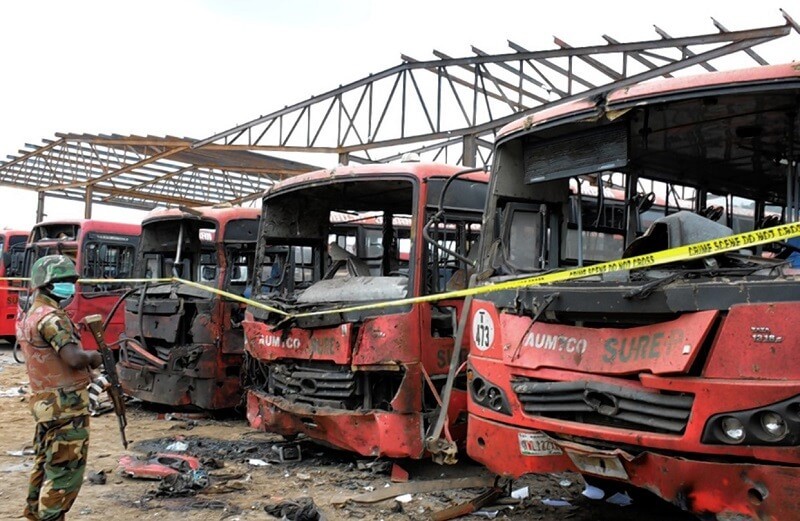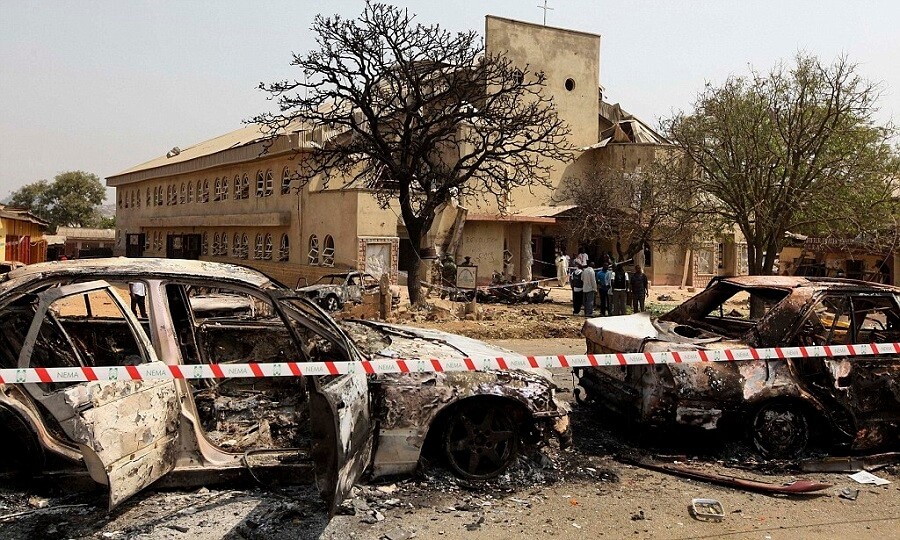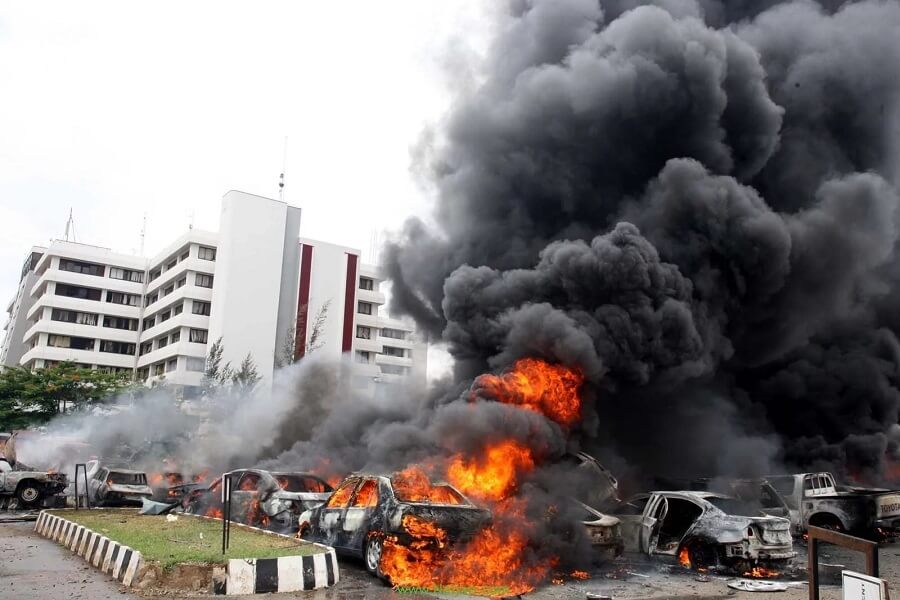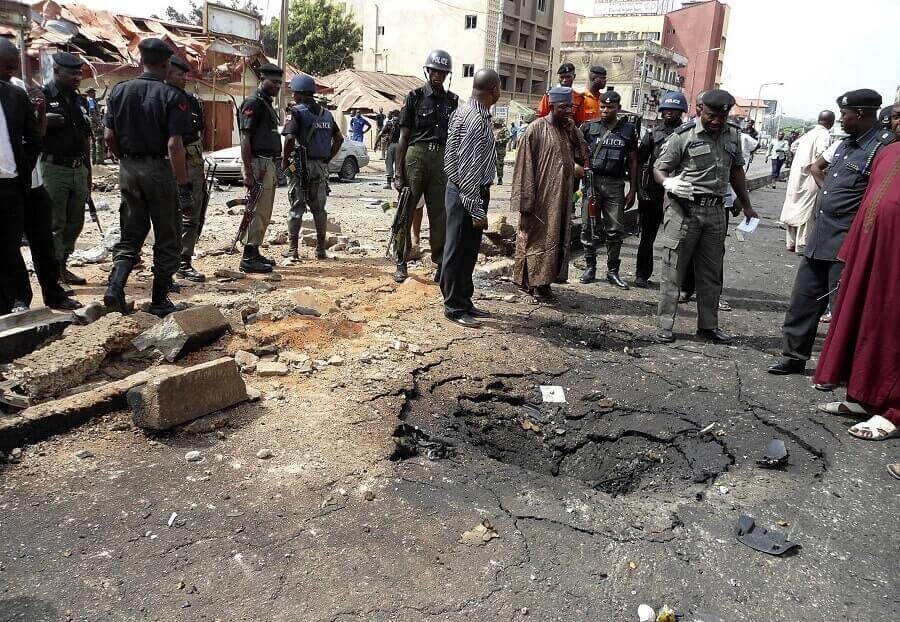ALERT! Four Ways Boko Haram May Strike Abuja Again
Residents of Abuja, Nigeria’s federal capital, have been apprehensive following reports that Boko Haram was planning massive new attacks on the Federal Capital Territory and its environs.
Abuja had recorded its last Boko Haram attack in June 2014, when the insurgents attacked Emab Plaza, a busy shopping district in the federal capital, killing at least 21 people and leaving no fewer than 52 injured.
Advertisement
An internal memo from the Nigeria Customs Service (NCS) had suggested that the terrorists were planning coordinated attacks on the FCT and neighbouring states and may have established five camps at strategic locations to carry out the attacks.
The memo said the five camps may have been established at Kunyam Bush, along airport road Abuja; Rubochi / Gwagwalada Forest; Kwaku Forest Kuje, Abuja; Unaisha Forest, Toto LGA, Nasarawa State; and Gegu Forest, near Idu Town in Kogi State.
Residents grew more fidgety after the Defence Headquarters (DHQ) issued a statement to assure them of their safety against the planned Boko Haram attacks.
Based on methods the insurgents used to carry out their previous attacks in Abuja, experts have suggested that it may not be out of place for Boko Haram to come up with fresh tactics but warned that their usual approach should not be overlooked.
Advertisement
Attacks On Marketplaces, Crowded Areas
One of the deadliest attacks carried out on Abuja by the Boko Haram insurgents is known today as the Nyanya bombing.
At least 88 were killed during the bomb attack that occurred at a crowded bus station in Nyanya, a densely populated area in Karu LGA, Nasarawa State, now considered as part of Abuja’s metropolitan area.

The insurgents launched the twin bomb attack at about 6:45 a.m. on April 14, 2014, when residents heading out to their places of work gathered at the popular motor park. At least 200 victims were hospitalized after the deadly attack.
Advertisement
The insurgents also attacked Emab Plaza, near the Banex Plaza, during the busy hours of June 25, 2014. The bomb blast left 21 people dead and 17 seriously injured.
No fewer than 118 people lost their lives in two bomb explosions that hit a marketplace and motor park in Jos, Plateau State, on May 20, 2014.
Bombings During Festivity
Boko Haram has carried out no fewer than five attacks during December or Christmas Day church services in Abuja and other parts of the country.
One of the insurgents’ earliest December attacks dates back to 2010, when a bomb blast went off at a beer garden inside an army barracks in Abuja, on New Year’s Eve.
Boko Haram had also claimed responsibility for the Christmas Eve bombings and church attacks that killed at least 38 people in Plateau State on Friday, December 24, 2010. The insurgents detonated two bombs near a large market in Jos where people had gone to do last-minute shopping.
Advertisement
On December 25, 2011, the insurgents also carried out coordinated attacks during Christmas Day church services in parts of the country.

The insurgents attacked worshipers at the St. Theresa Catholic Church, Madalla, during Christmas Day church service in 2011, killing at least 37 people and leaving 57 others injured. An explosion also hit the Mountain of Fire and Miracles Church in Jos on the same day.
Suicide Car Bombs/Unexpected Attacks
The terrorists had also carried out attacks on places least imagined, including the attacks on the United Nations building and the Police Force Headquarters in Abuja.
Both the UN building and Police headquarters attacks were car bomb explosions.

The UN bombing, which occurred on August 26, 2011, killed at least 21 and left 60 people injured. The insurgents broke through two security barriers and crashed the car conveying the bomb into the reception area of the UN building.
The insurgents deployed similar method during the police headquarters bombing on June 16, 2011. The attack was believed to be targeted at the Inspector General of Police.
A suicide bomber had driven after the convoy of the police chief into the premises of the Louis Edet House and detonated the bomb when stopped by the security. A traffic policeman the suicide bomber died in the attack.
Raid On Worship Centers
Another style of attack common with Boko Haram is the raid on worship centers. The insurgents have carried out series of attacks on Christian and Muslim worshipers during congregational prayers in parts of the country.
The insurgents were suspected to have carried out the mass shooting of worshipers at the Deeper Life Bible Church near Okene, Kogi State, on August 7, 2012.
The day after, gunmen suspected to be members of Islamic sect killed two soldiers and one civilian outside a mosque in Okene.

At least 38 people were reportedly killed on April 8, 2012, in a suicide car bombing that occurred on Easter Day near the All Nations Christian Assemblies International Church and the ECWA Good News Church in Kaduna.


